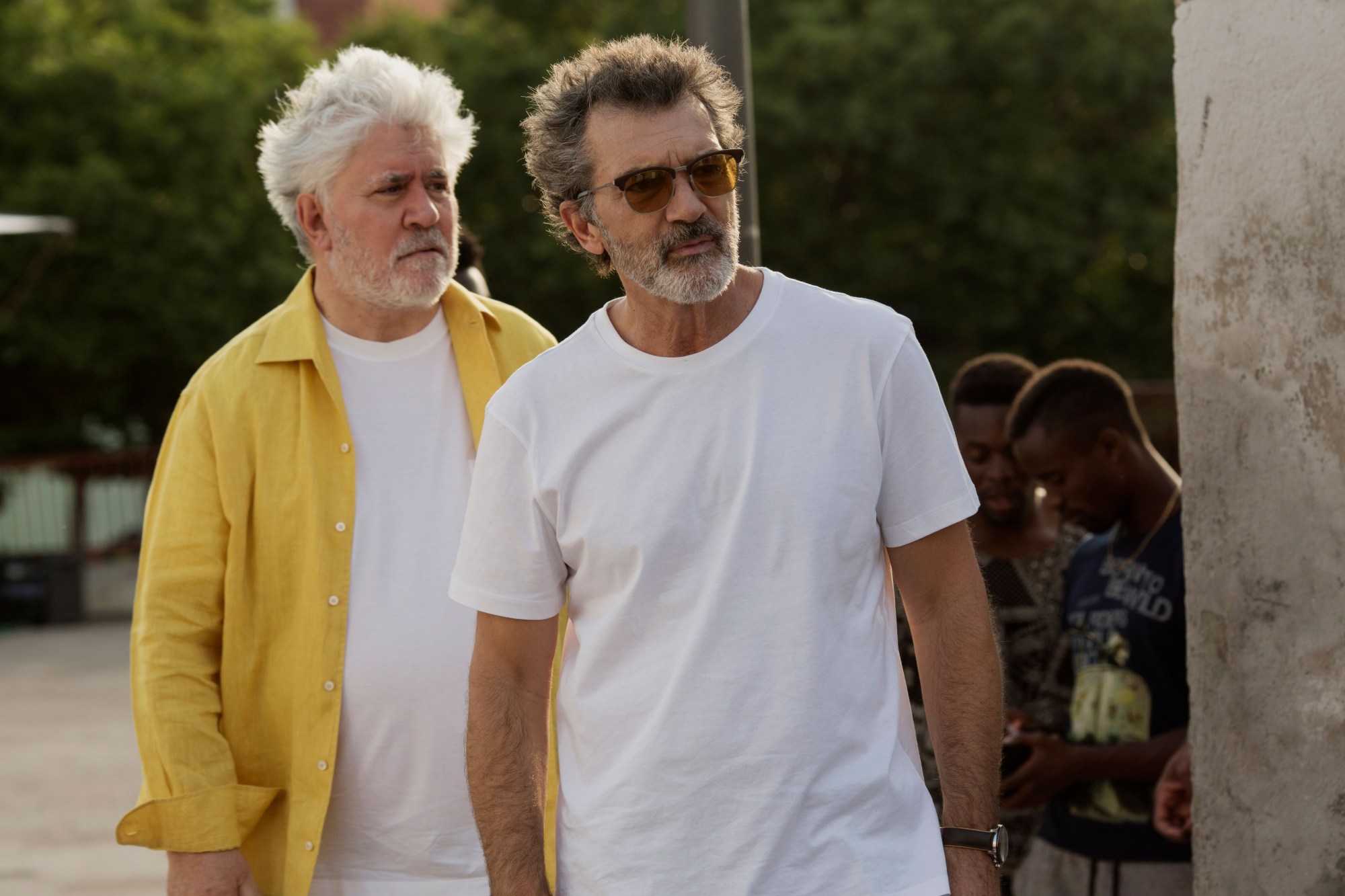Stepping into Pedro Almodóvar’s office in Madrid feels like stepping into one of his movies. The Spanish director, who is now nearly 70, begins by launching into stories about the posters, photographs and paintings that line the walls. There’s the original poster artwork for his 1987 film The Law of Desire. There are pictures of Carmen Maura, Rossy de Palma, Penelope Cruz and other chicas Almodóvar.
The particular film that comes to mind while sitting across from him at his desk is Bad Education, and its opening scene featuring the awkward Ángel (Gael García Bernal) visiting his film director friend Enrique (Fele Martínez). Bad Education received widespread global acclaim when it was released in 2004, but Almodóvar’s relationship with the film is complicated. “It was especially tough and painful to make,” he reveals. “I was left quite traumatised and I just couldn’t watch it for almost 15 years.”
The protagonist of Almodóvar’s new film Pain and Glory experiences something nearly identical. In this strikingly autobiographical work, the film director Salvador Mallo (played by longtime Almodóvar muse Antonio Banderas) confronts his tortured relationship with a movie he once made – along with several other ghosts from his past. Suffering from a long list of physical ailments, Salvador is ultimately forced to face and resolve the pain in his life.
Like so many of Almodóvar’s films, Pain and Glory is also a layered narrative, constructed from several sub-stories. There is “The Addiction”, a theatrical monologue about life in 80s Madrid; “The First Desire”, a tale recounting his first stirrings of sexual lust as a young boy. These are among the short pieces that Almodóvar has written over the years in an attempt to grapple with his own past, and which finally come together in Pain and Glory as part of a bigger life story – as much about the protagonist as for the director himself.
As the title suggests, pain is one of the main themes, but pain is not an easy thing to film. “Especially when it’s that passive, internal pain that doesn’t involve any action or any movement,” he explains. “It’s very difficult, cinematographically. There’s very little you can do with the camera – a lying down shot, and that’s it.”
But whether physical or emotional, few depict pain with such dexterity as Almodóvar. Characters like Manuela (Cecilia Roth) in All About My Mother, Marco (Darío Grandinett) in Talk to Her or the eponymous protagonist of Julieta (Emma Suárez) all illustrate the director’s exquisite talent for narrating the human experience of suffering in all its beauty. “Pain is part of all of our lives – we need to learn how to live with it,” he says. “Pain can even form part of happiness. That’s just part of our nature, unfortunately.”

Pain and Glory also allows Almodóvar to revisit the theme of addiction, through Salvador’s relationship with heroin – both his own use as well as that of those he has known and loved. Heroin was commonplace in Madrid’s party scene in the 1980s when Almodóvar emerged as a filmmaker. “The consumption of drugs was a part of daily life,” he says – and although he has never taken heroin himself, he was around it on a daily basis back then. “I remember being on holiday in Ibiza, there were 20 of us staying in a villa and there were only two of us who weren’t taking it.”
“I never had anything against heroin,” he continues, “but from the beginning, I got the feeling that it was a drug that wouldn’t agree with me. I’m a very active person and it wouldn’t have gone well with my character. And just living surrounded by people who were taking it, I started seeing the effects very quickly – I think that was the best antidote.”
Instead, ideas are what constitute the biggest addiction for Almodóvar. “I’ve never really been addicted to a substance. But when you’re in contact with a new idea, you feel possessed. It’s such a strong feeling to have a new idea in your hands…” He softens, searching for the words: “Those are the greatest moments of happiness in my life. And you don’t share them with anyone. I think my greatest addiction has been the search for those moments.”
“The phenomenon of the extreme right in Europe isn’t new but for Spaniards the memories of the Civil War are so strong that I never thought there would be another extreme right party in Spain.”
The introspective nature of Pain and Glory comes with a certain sense of finality. But those who think this might be a swan song should think again – between various trips around the world to promote his new film, Almodóvar is already busy creating his next projects. “I’m always working on more than one story,” he says. “I think this will be for the next film – but you never know until you finish.” It’s clear that his “addiction to inspiration” shows no sign of waning.
Nonetheless, for whatever reason, this has been a moment for director (and his avatar-protagonist in the film) to take stock and look back; at his sexual awakenings and at how his sexual orientation impacted his relationship with his mother (played in the film alternately by Julieta Serrano and Penelope Cruz); or, at his formative yet fraught memories of the movida madrileña, the hedonistic explosion of social, cultural and sexual freedom that emerged in the 80s following the end of Franco’s dictatorship.

It was during the movida madrileña that Almodóvar became such an emblematic symbol of post-fascist Spain, and his films came to define much of the country’s radical, progressive new spirit. And so, it’s with particular anguish that people like him regard the rise of a new far right that the country is seeing today. “The phenomenon of the extreme right in Europe isn’t new,” Almodóvar says, “but for Spaniards the memories of the Civil War are so strong that I never thought there would be another extreme right party in Spain.”
“Young people don’t remember the 1970s and ’80s, all the effort we’ve all made to achieve all the rights we now have.” It is alarming, he says, that the extremist party Vox has found power. “Their messages totally recall our Francoist past. It’s as if we hadn’t advanced at all in the last forty years.”
For so many Spaniards like him, there are certain horrors best left in the past – learned from, but never to be repeated. In Pain and Glory, Salvador’s past contains a destructive relationship from which both parties had to escape – and he is forced to confront this dark past through a heart-rending reencounter with the ex-lover in question, Federico. But Almodóvar wanted his protagonist, in some way or another, to emerge victorious from this darkness. “I didn’t want him to be a victim,” he says. “I’m not a victim either.”
There’s a blurred line between Salvador Mallo and Pedro Almodóvar. Both have conflicted relationships with their artistic creations, both make movies to try to make sense of their worlds. And both battle with ghosts from their past – Almodóvar too has had a Federico in his life, someone from whom he also had to separate for the sake of both their wellbeing. “But I never had the reunion,” he says with a smile, “I had to write that myself.”
Pain and Glory is in UK cinemas from the 23rd of August.
